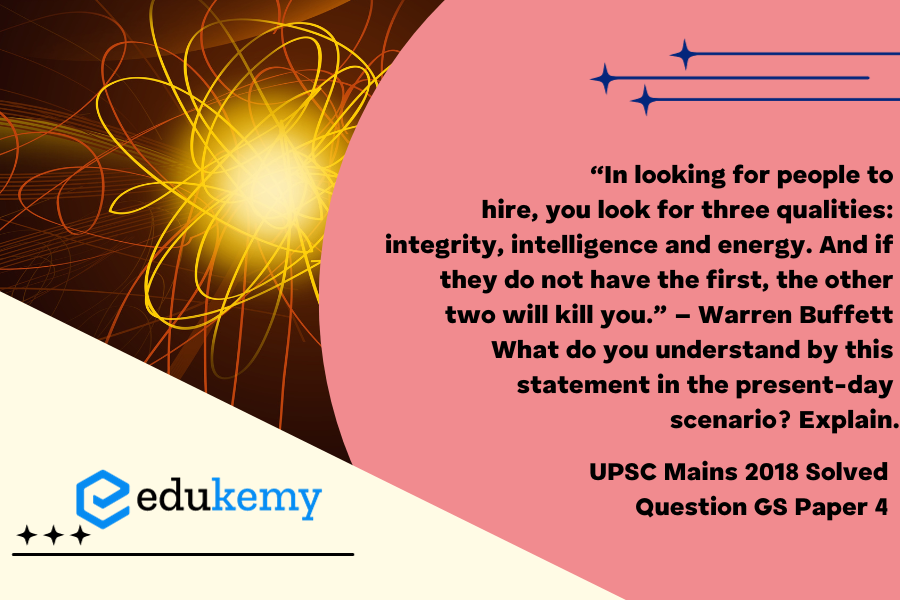Warren Buffett’s insightful perspective on hiring, emphasizing the qualities of integrity, intelligence, and energy, remains profoundly relevant in the present-day scenario. In the contemporary workplace, characterized by rapid technological advancements and dynamic global challenges, these qualities have become even more critical. Integrity, the foundation of ethical behavior and trustworthiness, ensures employees uphold moral principles in decision-making. In an era where ethical lapses can have severe consequences, integrity becomes a safeguard against reputational risks. Intelligence, encompassing both cognitive abilities and emotional intelligence, is essential for navigating complex problems and fostering innovation. Energy signifies not just physical vigor but also enthusiasm and a proactive approach, vital for adapting to a fast-paced and demanding professional landscape. Buffett’s assertion warns that a lack of integrity compromises the foundation of a team, rendering intelligence and energy futile. This statement underscores the enduring importance of these qualities in shaping successful, resilient teams amid the challenges of the contemporary work environment.
Tag: Human Values – lessons from the lives and teachings of great leaders, reformers and administrators.
Contents
Decoding the Question:
- In the Introduction, try to define integrity and mention its significance in brief.
- In Body,
- Discuss the denotation of integrity.
- Discuss about integrity for civil servants.
- Explain the relevance of the quote in the present-day scenario.
- In Conclusion, try to write a way forward (In brief).
Answer:
In ethics, the term ‘integrity’ means the quality of being honest and having strong moral principles that one refuses to change. In the present-day scenario, most of the global organizations look for people having qualities like, intelligence, energy, passion, etc. but they put more emphasis on integrity as it matters the most to make a progressive and value based work culture. Moreover, in today’s Indian bureaucracy, the Union Public Service Commission as well as other government agencies are also looking for people with integrity and have strong morals for the various responsible positions.

The denotation of Integrity:
- Integrity in essence means adherence to principles. It is a three-step process:
- Choosing the right course of conduct.
- Acting consistently with the choice—even when it is inconvenient or unprofitable to do so.
- Openly declaring where one stands.
- Accordingly, integrity is equated with moral reflection, steadfastness to commitments, trustworthiness. Therefore, all three are equally important.
Example: Some of the present day problems like tax evasion by corporate houses in India, terrorism by educated youths,unethical business practices etc. are carried on by intelligence and energetic interest, but become very dangerous due to lack of integrity.
Integrity for Civil Servant:
- The Nolan commission said, ‘Holders of public office should not place themselves under any financial or other obligation to outside individuals or organizations that might influence them in the performance of their official duties’.
- It can be seen that being a civil servant of integrity, a person must have high moral standards, be honest towards his objectives and be consistent in the decision-making process – he should not only be honest and truthful, but also perceived to be so.
- They must declare and resolve any interests and relationships.
Relevance of this quote in present-day scenario:
- In the current scenario, it means that intelligence and energy without the moderating touch of integrity are dangerous. This could create leaders, policy makers or civil servants dangerous for society and nation.
- Integrity or moral soundness is a greater virtue than intelligence and energy. Integrity helps keep the energy and the intelligence in check and puts them to good use. People without integrity (but loaded with intelligence) are not to be hired or trusted.
- Any reliable person would be one with integrity. One without integrity but intelligence could be a potential thief or a fraud. Many financial frauds are often committed by those who are low on integrity but very high on energy and intelligence.
Ways to inculcate integrity:
- Through Model Learning: If a young recruit’s first posting is made under an honest officer, then he’s more likely to remain honest because of mentoring by a good role model.
- Reward and Punishment: To consolidate a newly developed value, appropriate behavior must be rewarded and inappropriate should be punished accordingly. This is called the ‘carrot and stick’ policy.
- Sensitivity Training: Under this kind of training, the person is made to learn the desired value through role-playing, so that he understands the nuances of it.
- Code of Ethics and Code of Conduct: 2nd ARC recommends setting up a code of ethics for all departments of the government. It’ll have a broad principle- that all participants have to follow and its reports will be given and evaluated by the departmental head
In today’s political, economic, and administrative field, policy makers and leaders without integrity would create chaos and danger for society. A person with low integrity would compromise on values and subvert social progress while furthering his or her progress with his/her intelligence.
Integrity can be promoted through increasing transparency, moral education, adhering to code of ethics, developing a system to award integrity and many more. Integrity gives direction and purpose to our intelligence and energy.
In case you still have your doubts, contact us on 9811333901.
For UPSC Prelims Resources, Click here
For Daily Updates and Study Material:
Join our Telegram Channel – Edukemy for IAS
- 1. Learn through Videos – here
- 2. Be Exam Ready by Practicing Daily MCQs – here
- 3. Daily Newsletter – Get all your Current Affairs Covered – here
- 4. Mains Answer Writing Practice – here


